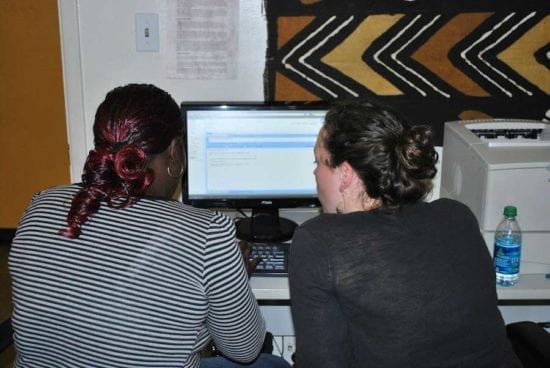Ki sa ki se yon tradiktè ak entèprèt?
Entèprèt lang ak tradiktè ede moun konprann sa y ap di nan yon lòt lang. Yo chanje sa yo di oswa ekri nan yon lòt lang. Se yon bon chwa karyè pou yon moun ki pale plis pase yon lang.
Entèprèt tradui mo yo pale. Yo bay sèvis lang yo an pèsòn, nan telefòn, oswa atravè videyo. Gen diferan kalite entèpretasyon.
- Konsekitif: tradui kèk fraz nan yon moman
- Similtane: tradui diskou an menm tan yo pale
- Trilingual: tradui diskou ant twa lang
Tradiktè yo entèprete tèks ekri, tankou liv ak atik, ansanm ak dosye odyo ak videyo.
Nan ki domèn mwen ka espesyalize?
Ou ka espesyalize nan youn oswa plizyè lang patikilye. Genyen tou opsyon pou espesyalize nan yon sèten domèn.
Zòn espesyalite |
Egzanp tradiksyon |
|---|---|
Biznis |
reyinyon, konferans |
Edikasyon |
kourikoulòm lekòl la, materyèl pou fanmi ki pa pale Anglè |
Sante |
vizit pasyan-doktè, dosye medikal |
Gouvènman |
politik, pwogram |
Kominote |
evènman kominote a |
Fim ak literati |
liv, redaksyon, sous-titres pou yon fim |
Imigrasyon |
aplikasyon, dokiman pèsonèl |
Jounalis |
atik nouvèl, entèvyou |
Lwa |
dokiman legal, odyans, jijman |
Vwayaje |
vwayaj |
Entèprèt ak tradiktè k ap travay nan domèn espesifik anjeneral gen konesans sou sijè jeneral la epi yo abitye ak tèm teknik.
Ki konpetans mwen bezwen?
Pou w vin yon tradiktè oswa yon entèprèt ki gen siksè, ou bezwen sèten konpetans ak eksperyans.
Konpetans lang
Ou dwe pale, li, epi ekri byen nan de oswa plis lang. Bon ladrès gramè yo enpòtan tou.Koute ak ladrès konsantrasyon
Ou dwe kapab peye anpil atansyon sou sa y ap di oswa ekri. Ou bezwen konsantre pou byen tradui.Ladrès kominikasyon
Ou dwe kapab pataje enfòmasyon avèk presizyon. Li enpòtan pou endike aklè reyalite yo ak lide.Ladrès entèpèsonèl
Ou dwe konfòtab pale ak diferan kalite moun epi kominike byen ak lòt moun. Sa a se espesyalman enpòtan pou entèprèt an pèsòn.Konsyans kiltirèl
Ou dwe konprann tèm kiltirèl, lide, ak pratik pou lang w ap tradui soti nan ak nan lang yo. Ou dwe kapab ajiste sa w ap tradui pou li apwopriye pou kiltirèl.Konesans teknik
Ou bezwen abitye ak tèm teknik si w ap espesyalize nan yon sèten endistri oswa domèn.Konpetans òdinatè
Si w ap tradui tèks ekri, li souvan itil pou konnen kijan pou itilize diferan aplikasyon òdinatè tankou Microsoft Word, Excel, ak dokiman Google.
Konbyen kòb mwen ka touche?
Ou ka fè $29,000 pou plis pase $97,000 yon ane kòm yon tradiktè aplentan oswa entèprèt. Pifò touche anviwon $49,000 yon ane oswa $25 pou chak èdtan. Peye w depann de espesyalite lang ou, konpetans ou, ak edikasyon ou.
Ki kalite edikasyon mwen bezwen?
Sa a ka varye selon travay la. Gen pwogram kolèj pou prepare w pou yon karyè nan entèpretasyon ak tradiksyon men yo souvan pa obligatwa. Yon diplòm kolèj nan lang natif natal ou oswa yon lòt lang ka fè ou plis kalifye pou yon travay entèprèt oswa tradiktè. Ou kapab tou pran kou sou sijè teknik si ou vle espesyalize nan yon domèn sèten.
Si w bezwen amelyore konpetans ou nan lang Anglè dabò, jwenn kou ak aplikasyon pou Anglè gratis. Konsidere klas GED® gratis an liy nou an si w bezwen yon diplòm lekòl segondè.
Èske mwen bezwen sètifye?
Pifò travay entèpretasyon ak tradiksyon pa mande sètifikasyon. Ou ka bezwen sètifikasyon pou travay kòm yon tradiktè pwofesyonèl nan sèten domèn, tankou gouvènman, lalwa, oswa medikaman. Gen diferan òganizasyon ki ofri sètifikasyon.
- Asosyasyon tradiktè Ameriken pou tradiksyon jeneral nan 17 lang
- Komisyon Sètifikasyon pou Entèprèt Swen Sante pou entèpretasyon swen sante an panyòl, arab, ak mandaren
- Komisyon Konsèy Nasyonal Sètifikasyon pou Entèprèt Medikal pou entèpretasyon medikal nan lang Panyòl, Mandaren, Kantonèz, Ris, Vyetnamyen ak Koreyen
- Asosyasyon Nasyonal Entèprèt Jidisyè pou edikasyon kontinyèl gratis pou travay nan tribinal
- Rejis Entèprèt pou Soud pou langaj siy jeneral
- Depatman Deta Ameriken pou tès aptitid
Kouman mwen ka jwenn eksperyans?
Pifò travay yo pral mande pou ou gen eksperyans kòm yon tradiktè oswa entèprèt. Yon bon fason pou jwenn eksperyans ak aprann sou pwosesis tradiksyon an se volontè. Ou kapab:
- Ofri èd nan kominote lokal ou a
- Chèche opòtinite sou sit entènèt tankou VolunteerMatch
USAHello, ansanm ak patnè nou yo Tarjimly ak Translators Without Borders, yo toujou ap chèche tradiktè volontè. Ou ka ranpli fòm volontè nou an si w enterese ede tradui paj sitwèb nou yo ak lòt kontni. Nou toujou kontan ekri lèt rekòmandasyon pou volontè nou yo.
Ou ka jwenn eksperyans pratik tou lè w enskri pou estaj oswa ofri sèvis lang endependan.
Ki kote mwen ka jwenn opòtinite travay?
Ou ka chèche travay entèpretasyon ak tradiksyon sou entènèt la.
- Travay jeneral: LinkedIn, Vreman vre, Mons
- Travay endependan: Upwork
- Travay ki pa Peye: Idealist.org
- Travay Gouvènman pou sitwayen ameriken: usajobs.gov
Jwenn konsèy ak resous sou ki kote pou jwenn travay.
Pifò tradiktè nan peyi Etazini travay aplentan ak lakay yo. Yo anjeneral travayè endepandan men kèk ka travay pou ajans ki ofri sèvis tradiksyon. Entèprèt souvan vwayaje pou bay sèvis entèpretasyon an pèsòn.
Ki lang ki mande pou entèpretasyon ak tradiksyon?
Gen yon bezwen pou bon tradiksyon nan pifò endistri US. Lang sib yo mande yo enkli:
- Arab
- Chinwa
- Dari
- Filipino
- Fransè
- Alman
- Hindi
- Japonè
- Koreyen
- Maya
- Mixtec
- Pashto
- Pòtigè
- Ris
- Panyòl
- Ukrainian
- Vyetnamyen
- Zapotèk
Sa yo ka byen vit chanje selon evènman aktyèl yo. Evakyasyon Afgan an ak lagè Ikrenyen te montre nou sa.
Enfòmasyon ki nan paj sa a vini de USA.gov, Bureau of Labor Statistics, ak lòt sous nou ka fè konfyans. Objektif nou se pou ofri enfòmasyon ki fasil pou konprann epi yo mete yo ajou regilyèman. Enfòmasyon sa yo pa konsèy jiridik.


